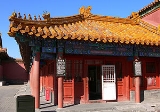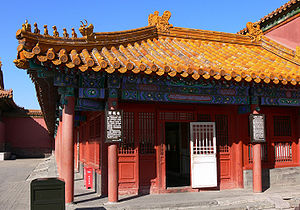
Grand Council
Encyclopedia

Manchu language
Manchu is a Tungusic endangered language spoken in Northeast China; it used to be the language of the Manchu, though now most Manchus speak Mandarin Chinese and there are fewer than 70 native speakers of Manchu out of a total of nearly 10 million ethnic Manchus...
:
 coohai nashūn i ba; literally, "Office of Military Secrets") was an important policy-making body in the Qing Empire. It was established in 1733 by the Yongzheng Emperor
coohai nashūn i ba; literally, "Office of Military Secrets") was an important policy-making body in the Qing Empire. It was established in 1733 by the Yongzheng EmperorYongzheng Emperor
The Yongzheng Emperor , born Yinzhen , was the fifth emperor of the Manchu Qing Dynasty and the third Qing emperor from 1722 to 1735. A hard-working ruler, Yongzheng's main goal was to create an effective government at minimal expense. Like his father, the Kangxi Emperor, Yongzheng used military...
. The Council was originally in charge of military affairs, but gradually attained a more important role and eventually attained the role of a privy council
Privy council
A privy council is a body that advises the head of state of a nation, typically, but not always, in the context of a monarchic government. The word "privy" means "private" or "secret"; thus, a privy council was originally a committee of the monarch's closest advisors to give confidential advice on...
, eclipsing the Grand Secretariat
Grand Secretariat
The Grand Secretariat was nominally a coordinating agency but de facto the highest institution in the Ming imperial government. It first took shape after Emperor Hongwu abolished the office of Chancellor in 1380 and gradually evolved into an effective coordinating organ superimposed on the Six...
in function and importance, which is why it has become known as the "Grand Council" in English.
Despite its important role in the government, the Grand Council remained an informal policy making body in the inner court and its members held other concurrent posts in the Qing civil service. Originally, most of the officials serving in the Grand Council were Manchu
Manchu
The Manchu people or Man are an ethnic minority of China who originated in Manchuria . During their rise in the 17th century, with the help of the Ming dynasty rebels , they came to power in China and founded the Qing Dynasty, which ruled China until the Xinhai Revolution of 1911, which...
s, but gradually Han Chinese officials were admitted into the ranks of the council. One of the earliest Han Chinese officials to serve in the Council was Zhang Tingyu
Zhang Tingyu
Zhang Tingyu was a Han Chinese politician and historian during the Qing Dynasty.Zhang Tingyu was born in Tongcheng in Anhui province. In 1700, he was awarded the highest degree in the imperial examinations and shortly afterwards he was appointed to the Hanlin Academy...
. The chancellery was housed in an insignificant building just west of the gate to Palace of Heavenly Purity
Palace of Heavenly Purity
The Palace of Heavenly Purity, or Qianqing Palace is a palace in the Forbidden City in Beijing, China. It is the largest of the three halls of the Inner Court , located at the northern end of the Forbidden City...
in the Forbidden City
Forbidden City
The Forbidden City was the Chinese imperial palace from the Ming Dynasty to the end of the Qing Dynasty. It is located in the middle of Beijing, China, and now houses the Palace Museum...
.
Council of Princes and High Officials
In the early part of the Qing dynastyQing Dynasty
The Qing Dynasty was the last dynasty of China, ruling from 1644 to 1912 with a brief, abortive restoration in 1917. It was preceded by the Ming Dynasty and followed by the Republic of China....
, political power was held by the Council of Princes and High Officials (議政王大臣會議), which consisted of eight imperial princes who served as imperial advisers at the same time. It also included a few of Manchu
Manchu
The Manchu people or Man are an ethnic minority of China who originated in Manchuria . During their rise in the 17th century, with the help of the Ming dynasty rebels , they came to power in China and founded the Qing Dynasty, which ruled China until the Xinhai Revolution of 1911, which...
officials. Established in 1637, the Council was responsible for deciding major policies of the Imperial government. Decisions of the Council had precedence over decisions of the Imperial Cabinet. Under rules set by Nurhaci
Nurhaci
Nurhaci was an important Jurchen chieftain who rose to prominence in the late sixteenth century in what is today Northeastern China...
, the Council even had the power to depose the Emperor. In 1643, the Shunzhi Emperor
Shunzhi Emperor
The Shunzhi Emperor was the third emperor of the Manchu-led Qing dynasty, and the first Qing emperor to rule over China, which he did from 1644 to 1661. "Shunzhi" was the name of his reign period...
expanded the Council's composition to Han
Han Chinese
Han Chinese are an ethnic group native to China and are the largest single ethnic group in the world.Han Chinese constitute about 92% of the population of the People's Republic of China , 98% of the population of the Republic of China , 78% of the population of Singapore, and about 20% of the...
officials, with its mandate expanded to all important decisions relating to the State. The Council's powers gradually waned after the establishment of the Southern Study and the Grand Council, and it was abolished in 1717.
Southern Study
The Southern Study ( 南書房; ManchuManchu language
Manchu is a Tungusic endangered language spoken in Northeast China; it used to be the language of the Manchu, though now most Manchus speak Mandarin Chinese and there are fewer than 70 native speakers of Manchu out of a total of nearly 10 million ethnic Manchus...
:
 Julergi bithei boo) was an institution that held the highest policy-making power after its establishment in 1677. It was abolished in 1898. The Southern Study was built by the Kangxi Emperor
Julergi bithei boo) was an institution that held the highest policy-making power after its establishment in 1677. It was abolished in 1898. The Southern Study was built by the Kangxi EmperorKangxi Emperor
The Kangxi Emperor ; Manchu: elhe taifin hūwangdi ; Mongolian: Энх-Амгалан хаан, 4 May 1654 –20 December 1722) was the fourth emperor of the Qing Dynasty, the first to be born on Chinese soil south of the Pass and the second Qing emperor to rule over China proper, from 1661 to 1722.Kangxi's...
in the south-western corner of the Palace of Heavenly Purity
Palace of Heavenly Purity
The Palace of Heavenly Purity, or Qianqing Palace is a palace in the Forbidden City in Beijing, China. It is the largest of the three halls of the Inner Court , located at the northern end of the Forbidden City...
. Members of the Hanlin Academy
Hanlin Academy
The Hanlin Academy was an academic and administrative institution founded in the eighth century Tang dynasty China by Emperor Xuanzong.Membership in the academy was confined to an elite group of scholars, who performed secretarial and literary tasks for the court. One of its main duties was to...
, selected on the basis of literary merit, were posted to the Study so that the Emperor had easy access to them when he sought counsel or discussion. When posted to the Study, officials were known as "[having] access to the Southern Study" (南書房行走). Because of their proximity to the Emperor, official posted to the Study became highly influential to the Emperor. After the establishment of the Grand Council, the Southern Study remained an important institution but lost its policy advisory role. Officials regarded secondment to the Southern Study as an honorable recognition of their literary achievements. In Chinese, the term "access to the Southern Study" in modern usage indicates a person who, through channels other than formal government office, has significant influence over leaders of the government.
Establishment of the Grand Council
In 1729, the Yongzheng EmperorYongzheng Emperor
The Yongzheng Emperor , born Yinzhen , was the fifth emperor of the Manchu Qing Dynasty and the third Qing emperor from 1722 to 1735. A hard-working ruler, Yongzheng's main goal was to create an effective government at minimal expense. Like his father, the Kangxi Emperor, Yongzheng used military...
launched a military offensive against the Dzungars. Concerns were raised that the meeting location of the Imperial Cabinet (outside the Gate of Supreme Harmony
Gate of Supreme Harmony
The Gate of Supreme Harmony , is the second major gate at the southern side of the Forbidden City.The gate was originally built during the Ming Dynasty, when it was called Fengtianmen . Following the Qing conquest of China, the gate was given its present Chinese and Manchu name.It is flanked by two...
) did not ensure security for military secrets. The Junjichu was then established in the Inner Court of the Forbidden City
Forbidden City
The Forbidden City was the Chinese imperial palace from the Ming Dynasty to the end of the Qing Dynasty. It is located in the middle of Beijing, China, and now houses the Palace Museum...
. Trustworthy members of Cabinet staff were then seconded to work in the new Office. After defeating the Dzungars, the Emperor found that the streamlined operations of the Office of Military Secrets avoided problems with bureaucratic inefficiency. As a result, the Junjichu turned from a temporary institution into a "Grand Council", quickly outstripping the powers of the Council of Advisor Princes, and the Southern Study, to become the chief policy-making body of the Empire.
In 1736, the newly enthroned Qianlong Emperor
Qianlong Emperor
The Qianlong Emperor was the sixth emperor of the Manchu-led Qing Dynasty, and the fourth Qing emperor to rule over China proper. The fourth son of the Yongzheng Emperor, he reigned officially from 11 October 1735 to 8 February 1796...
abolished the Grand Council, with all members sent back to their original posts. However, this arrangement proved unsatisfactory, and two years later, in 1738, the Grand Council was reconstituted.
Composition
The number of officials comprising the Council varied from time to time, from as few as three to as many as ten. Usually, the number of officials serving in the Council was five, two Manchus, two Han Chinese and one Prince of the Blood, who acted as president. The most senior among them was called the Chief Councillor (Lǐngbān jūnjī dàchén, 領班軍機大臣), but this was simply a working designation and was not an official title.General
- Beatrice S. Bartlett. Monarchs and Ministers: The Grand Council in Mid-Ch'ing China, 1723-1820. Berkeley, CA: University of California Press, 1991.
- Ho, Alfred Kuo-liang. "The Grand Council in the Ch'ing Dynasty." The Far Eastern Quarterly 11, no. 2 (1952): 167-82.

